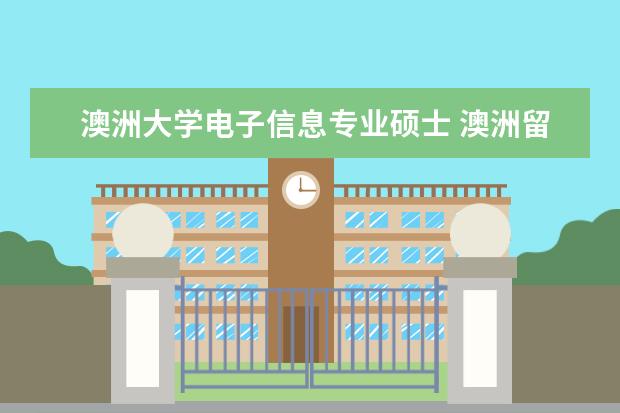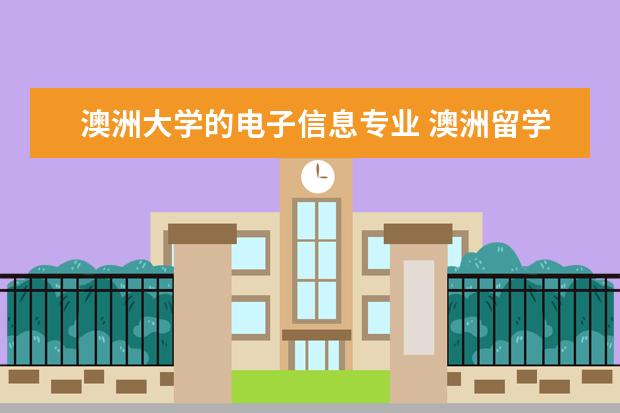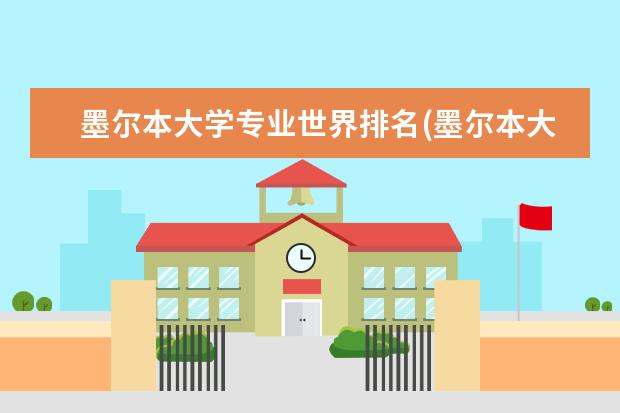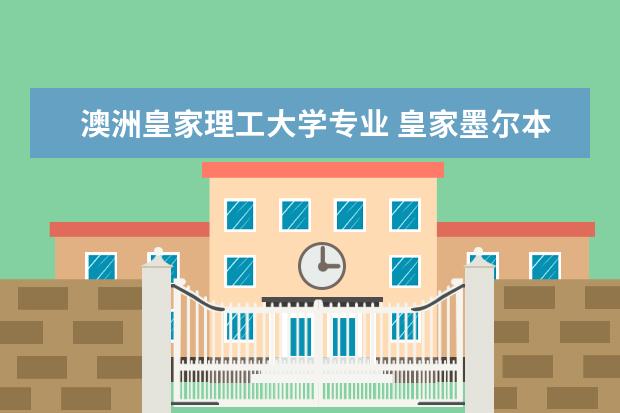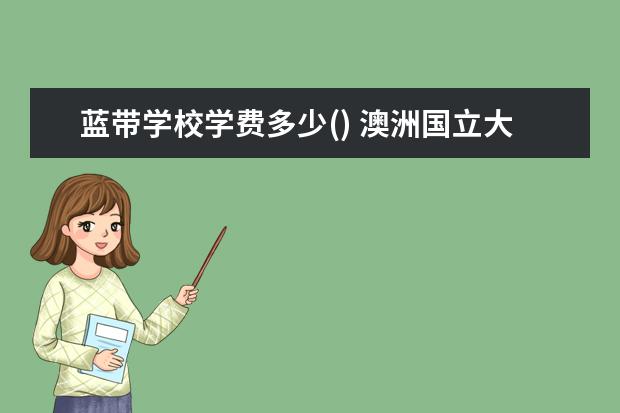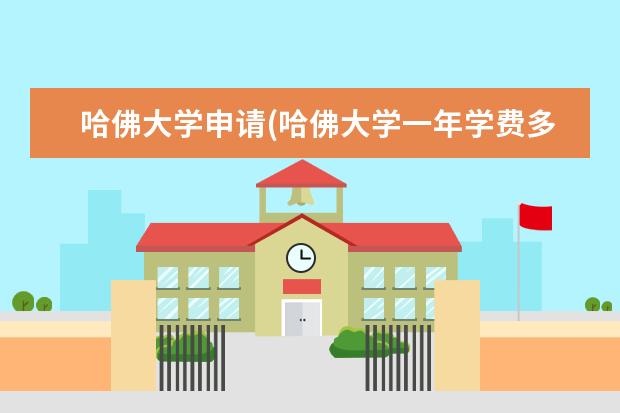最近经常有小伙伴私信询问墨尔本皇家理工大学it专业介绍相关的问题,今天,蜕变学习小编整理了以下内容,希望可以对大家有所帮助。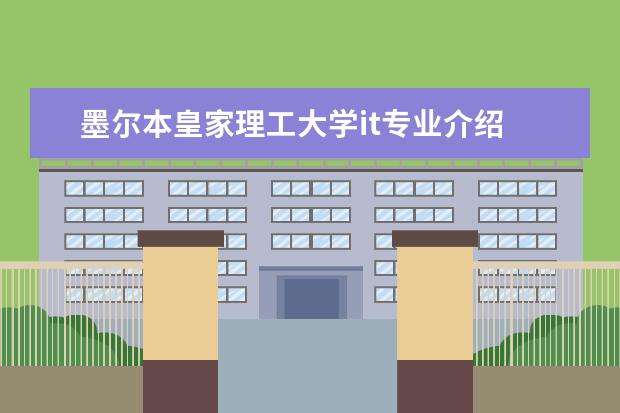
皇家墨尔本理工大学IT学院专升硕课程
皇家墨尔本理工大学计算机科学与信息技术学院
技术学士(计算机研究)
Bachelor of Technology (Computing Studies)
+
技术硕士
Master of Computing
?BP232 技术学士(计算机研究)Bachelor of Technology (Computing Studies)
CRICOS Code: 058731G
?MC062 技术硕士 Master of Computing
CRICOS Code: 065136B
皇家墨尔本理工大学是澳大利亚独创领先的重点院校之一。我校位于墨尔本市中心,作为一所创新型的国际化大学,实用化的课程教学,卓越的科学研究,与行业社区的紧密合作都为我校在国际上赢得了广泛的声誉。
皇家墨尔本理工大学拥有 65000 多名在旦汪校生,是澳大利亚最大的综合大学之一,在高等专业教育,职业培训,以及学术研究领域都享有国际盛誉,校友遍布全世界100多个国家。作为澳大利亚科技大学联盟的五所院校成员之一,我校还是 GU8 协会会员。我们与业界紧密合作,共同致力于为未来培养具备科技意识,事业型的领导人才。
皇家墨尔本理工大学计算机科学与模兆仔信息技术学院现拥有60多名在读博士生,在世界上享有极高的学术声望。最近,我校成为唯一参与全球软件巨头微软公司“超越搜索 ”( Beyond Search)项目的澳大利亚大学,并获得微软上百万的科研基金资助。
此项基金将用来完成为期12个月的研究项目,以进一步增强微软的网络搜索引擎。微软公司的发言人Lisa Hidebrandt 指出:“皇家墨尔本理工大学科研小组所提交的方案将人机交互语义检索与语义计算空间相结合,独具创新 ”。
我院的教学质量在学生调查中受到好评,我院教职人员在 2006 年度和 2007 年度都被评为科学,工程,与技术院系的最佳讲师。
在迅猛发展的信息技术业界,我校毕业生倍受青睐,应届毕业生就业率达到约 90% 。
两年制学士+ 硕士学位课程
(Two year packaged IT program)
完成被认可的三年专科学历或四年本科学位课程,并且平均分达到 70% 以上者;或已完成半年以上信息技术专业课程的在读专科生或本科生都有资格申请减免两年的学分,直接攻读 BP232 技术学士(计算机研究)学位课程。
BP232 技术学士学位课程旨在培养学生扎实的基础知识及先进的信息技术,为软件开发的职业发展打下坚实基础。我们着重强调对学生实际技能的培养,以确保学生毕业后即可胜任工作。
攻读 BP232 技术学士学位课程的学生在一年的学习过程中,可以根据自身情况制定学习计划并选择科目 ,为进一步攻读 MC062 技术硕士学位做好充分的准备。
攻读MC062 技术硕士学位课程的学生可以选择某一特定专门研究领域深化专业素质。
我院现开设以下专门研究领域:
*高级数据库
*计算机安全
*智能系统
*网络与分布式系统
*搜索引擎
*软件工程
*网络计算
*生物信息学
就业前景 (Career Prospects)
完成该两年制课程的学生就业前景广阔,可从事:软件开发与工程,网络系统,数据库开发,软件测试与质量保证,软件项目管理,网络,移动计算,及计算机安全等领域的工作。
专业认可 (Professional recognition)
该学士学位与硕士学位的专业水平均获得澳大利亚计算机协会认可。
入学要求 (Entrance Requirements)
教育程度
申请人需完成被认可的三年专科学历或四年本科学位课程,并且平均分达到 70% 以上。如果申请人过去所修课程中包含相当于半年的被认可的计算机科学或信猜氏息技术专业课程,申请人只需一年时间完成学士学位课程的学习。如果申请人过去没有学习过任何被认可的与信息技术相关的课程,则需要一年半的时间完成学士学位课程的学习。
我们将认真评估您的申请,为了便于评估您的申请,请同时提交详细的所学课程列表。圆满完成 BP232 技术学士学位课程并且平均分达到 60% 者有资格申请学分减免,通过一年的MC062 技术硕士学位课程学习获得硕士学位。
英语水平
满足以下之一
雅思(学术类)6.5 分,单科不低于 6.0 分 ;
托福(纸考)580 分,写作不低于4.5 分;
托福(机考)237 分,写作不低于4.5 分;
托福(网考)92 分,单项不低于20 分;
皇家墨尔本理工大学英语培训中心 (REW) 学术英语高级 2。
教学方法 (Teaching Methods)
我们采用多模式教学,包括大课讲授,专题讨论会 ,在线支持,以及使用多种工具的互动式项目研究小组。
成绩评估方法 (Asses*ent)
我们对学生的评估贯穿学生整个的学习过程,评估方法包括测验考试,论文和报告,课堂演讲,小组项目,研究课题项目,实验室课题项目,和实践性的课外作业。
申请手续 (Application Procedures)
截止日期:可在任何时间递交申请。每年2月与7月入学。
学费信息 (Fees)
学费每年 1 月 1 号都会调整。
学费减免 (Fee Reductions)
完成 BP232 技术学士学位课程后继续攻读MC062 技术硕士学位课程的学生将获得我院提供的2000 澳币的校友学费减免。
奖学金 (RMIT Scholarships)
皇家墨尔本理工大学将在五年中向学生提供六千万澳币的奖学金。学生有机会得到学校所提供的多种奖学金以及其他资助。
注:如果没有计算机专业的则需要读1.5年的本科然后再加1年硕士课程。
澳洲IT专业留学详细介绍

澳洲气候优越风景优美,是世界各地留学生的的向往之所。澳洲大学专业众多,那么IT专业怎么样呢?的我整理了澳洲IT专业留学详细介绍,欢迎阅读。
一、专业概述
IT包括很多专业方向、电脑图形、动画与游戏设计、电子商务技术、软件开发和软件工程、管理和营销、网络工程、网络安全、信息系统、传媒和网络安全、电子商务等。
二、毕业生起薪
澳洲的计算机专业教育领先,学生毕业后一般都能获得业界较高级别的认证。而且计算机行业也是目前澳洲发展势头最好的行业之一,在澳洲,一个普通的程序设计员的入职起薪点是4.5万元,而一个程序发展经理的薪水高达15万元。网络行政人员的薪金为4.5万元,网络经理则是11万元。调查显示从事计算机行业的人员23~25年龄段的薪金明显高于其他行业。
三、院校推荐
墨尔本大学:澳洲八大院校之一,是UNIVERSITAS 21组织成员之一,与工业界,*部门和其他有关部门都有密切的联系。学校世界排名36,计算机专业世界排名21,毕业生雇主评分高达86.7分。
澳国立大学:澳大利亚最好的大学,无论升烂是师资力量、教学设施还是研究水平都属于国内顶尖。大学世界排名24,计算机专业高游世界排名31,毕业生雇主评分86.8,甚至高于排名最高的墨尔本大学。
昆士兰大学:是世界一流大学,是澳大利亚最大、最有声望的大学之一,学校的教学和研究得到国际性的称赞,大学的学历被全世界所承认。学校2012年世界排名46,计算机专业世界排名39,计算机专业的毕业生雇主评分为81.4。
新南威尔士大学:澳洲八大之一,是一所综合性大学,学校注重教学与实践相结合,与许多当地及全世界的企业建立合作关系,为毕业生提供很好的就业机会。大学世界排40学校毕业生的雇主评分高达81.9。
悉尼大学:澳洲第一所大学,也是最好的大学之一。作为澳大利亚最为完善的综合大学,悉尼大学开设全澳洲最广泛,数目最多的课程供学生攻读。学校与澳大利亚许多企业合作,提供大量的就业机会。学校世界综合排名39 ,计算机专业戚笑销世界排名48。
另外计算机专业世界排名前一百的还有皇家墨尔本理工大学,昆士兰科技大学和计算机专业位于世界排名前两百的西澳大学、阿德莱德大学、悉尼科技大学和科廷大学等。
澳大利亚皇家墨尔本理工大学优势专业中英文介绍 - ...

工程Engineering
Bachelor of Engineering (Computer and Network Engineering)
工程硕士
Computer system engineers design and apply computer systems to provide efficient engineering solutions in almost every sectors of our society. Their work includes designing new products and systems, improving the operation of existing systems, integrating various sub systems and providing updated technical support.
Network engineers design, implement and maintain digital communication networks and computer networks, which are heavily used in our daily life.
Computer engineering in this program focuses on embedded systems design, computational intelligence, industrial information processing, intelligent robotics and multimedia systems which includes speech, image and video signal processing. These fields are driving rapid changes in industry and society, creating new opportunities for technology evolution and leading to the creation of new businesses with both industrial and domestic applications. Network Engineering in this program focuses on the advanced aspects of network design, optimisation, maintenance and protection. The program offers both fundamental knowledge and in-depth technology in network engineering. Internet telephony (i.e. Voice over IP), network performance and network security are some of the specialised areas in the program. Studying in this program also equips students with suitable knowledge for external examinations such as the CISCO CCNA and Microsoft MCSE.
Computer and network engineers play important roles in our society. They can contribute to the design and operation of international telecommunication networks and even space exploration. Their works directly or indirectly improve the quality of life, health and well being of individuals and communities, the productivity of industry, the competitiveness of all kinds of business and the effectiveness of government services.
In years one and two, you will learn the fundamental principles and practices in computer and network engineering, and the mathematics and physics that make up the essential engineering tools. You will also develop essential professional skills such as communication, teamwork, and leadership skills.
In years three and four, the focus is on making you industry ready. You will deepen the technical knowledge and skills in your chosen specialisation, and exercise your design, teamwork, leadership, management and communication skills through individual and team-based projects that closely resemble the work of practising engineers.
Bachelor of Engineering (Electrical Engineering)
工程硕士
Capacity to imagine and a desire to find creative solutions to problems are key to a career in engineering.
Electrical engineers devise engineering solutions for society. Engineers work with professionals in manufacturing, automation, agriculture, transport, resources and energy management, education, environmental monitoring, renewable energy, power generation and distribution, retail and industrial automation, and transportation.
You will learn through a wide variety of modes including lectures, tutorials, and especially laboratories. You will also need to spend a significant amount of your own time on self-directed learning.
In years one and two, you will learn the fundamental principles and practices in electrical engineering, and the mathematics and physics that make up the essential engineering tools. You will also develop essential professional skills including communication, teamwork, and leadership skills.
In years three and four, the focus is on making you industry ready. You will deepen the technical knowledge and skills in your chosen specialisation, and exercise your design, teamwork, leadership, management and communication skills through individual and team-based projects that closely resemble the work of practising engineers.
Bachelor of Engineering (Electronic and Communication Engineering)
工程硕士
入学要求: 雅思6.5, 单科不低于6.0; foundation 课程毕业
Electronic engineers design and apply electronic devices and systems to produce a wide range of goods and services for multiple users including from individuals and households to big industries, businesses and organisations.
Communication engineers design and apply electronic, optical and electromagnetic devices and systems to collect, distribute or exchange information between people or machines, over distances up to many thousands of kilometres across the world or in space. The information may take various forms such as voice, data, picture, audio, video or a combination thereof.
Electronic and communication products and services are a large part of modern living, from mobile phones and computers for individuals, broadband services and high definition TV for households and businesses, satellite navigation and sophisticated safety and control systems for cars, ships and planes, high resolution body scanners for hospitals, greener and cleaner technologies for energy production, satellite phones for remote communities and emergency services, right up to the tracking, telemetry and command (TT&C) and communication systems in satellites and space exploration capsules.
Electronic and communication engineers are the people who design, produce and maintain devices, systems and services that improve the quality of life, health and well being of individuals and communities, the productivity of industry (e.g. agriculture, resources, energy, manufacturing), the competitiveness of all kinds of business, and the effectiveness of government services (e.g. health, education, transport, defence and emergency services).
You will learn through a wide variety of modes including lectures, tutorials, and laboratories. You will also need to spend a significant amount of your own time on self-directed learning.
In years one and two, you will learn the fundamental principles and practices in electronic and communication engineering, and the mathematics and physics that make up the essential engineering tools. You will also develop essential professional skills in communication, teamwork, and leadership.
In years three and four, the focus will be on making you industry ready. You will deepen your technical knowledge and skills in your chosen specialisation, and exercise your design, teamwork, leadership, management and communication skills through individual and team-based projects that closely resemble the work of practising engineers.
Master of Engineering (International Automotive Engineering)
工程硕士
入学要求: 雅思6.5, 单科不低于6.0;
Automotive engineering is the application of principles drawn from the sciences in order to develop economical and sustainable automotive designs or to solve automotive problems. Encompassing complete car design, automotive engineering is global in scope and increasingly environmental in outlook. The industry generates and applies new technologies (e.g. hybrid power trains and fuel cells) for the betterment of society.
The degree has resulted from demands from the industry and students. It builds on a core program of mechanical engineering and offers specialist courses that enable a graduate to be immediately industry ready. Reflecting the increasing interaction between industry and higher education, you may also have the opportunity to take a one-year paid industrial placement with associated academic credit.
Automotive engineering courses include:
Vehicle power systems
An introduction to the development, design, specification, and operation of internal combustion engines for mobile applications with a focus on traditional spark-ignited and diesel engines. It also covers alternative power plants and fuels.
Motor vehicle design and vehicle manufacturing systems
Tackle and solve advanced engineering problems, particularly in the structural design and manufacturing of vehicles and automotive components. The course represents the basis for the *ysis and solution of problems related to modern automotive design and manufacturing and advanced computer modelling techniques of real engineering problems
Vehicle handling and control
Covers performance prediction relatively early in the design process and identifies the conflicts in designing for optimal performance in different modes.
Vehicle aerodynamics
Emphasis is placed on solving aerodynamic problems using a balance of computation and experimental techniques. The growing influence of styling on body shape is approached from both an artistic and a scientific viewpoint.
Vehicle noise and vibration
Understand the nature of sound, effectively document human non-linear response to sound, understand the relationship between noise and vibration, and appreciate the difference between structure-borne and air-borne sources.
以上就是蜕变学习小编整理的内容,想要了解更多相关资讯内容敬请关注蜕变学习。
免责声明:文章内容来自网络,如有侵权请及时联系删除。
本文标题:墨尔本皇家理工大学it专业介绍 澳洲IT专业留学详细介绍
wap地址: https://m.tbqqq.com/zixun/464738.html










